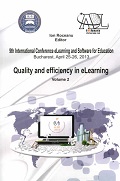STUDENTS' SUCCESS IN TRADITIONAL AND UBIQUITOUS COLLABORATIVE ACTIVITIES
STUDENTS' SUCCESS IN TRADITIONAL AND UBIQUITOUS COLLABORATIVE ACTIVITIES
Author(s): Nazime TuncaySubject(s): Education
Published by: Carol I National Defence University Publishing House
Keywords: Ubiquitous; Traditional; Collaborative; Success; Students
Summary/Abstract: Some students learn in virtual collaborative groups; some students learn better in mobile collaborative groups and some students learn in classroom-based collaborative groups. Nonetheless, still there is a group of students who claims not to have time for studying; who have lots of hours travelling and not internet connection. Students learn differently, and if teachers teach in a lot of different ways, they will help more students. Students not only learn in traditional class lectures, but they learn in ubiquitous collaborative activities. While traditional classes consist of little opportunities for collaborative activities, ubiquitous classes consist of permanent, accessible, immediate, interactive and flexible approach notes and activities that can be made at “anytime”, “anyhow” and “anywhere”. This research study aimed to observe the effect of the collaborative activities that students can make “everywhere”, “anytime” and “anyhow” on their collaborative success. For this purpose, two groups of the third form university students in Cyprus, ages between 19 and 22 attained to two different educations (Traditional Education and Ubiquitous Education) for 5 months. The groups consisted of 50 students each. First group attained to lectures and buzz groups activities in class, and as a difference, from the traditional classroom learning; the information was available to the ubiquitous group of students even when they are driving a car. Ubiquitous group students had several choices: attaining offline courses, attaining online asynchronous courses, listening to the lectures from the radio; or attaining to ubiquitous buzz group activities. The result was a lot better than expected. The students who attained to ubiquitous collaborative activities were more self-confident and more successful than the students who have attained to traditional activities.
Journal: Conference proceedings of »eLearning and Software for Education« (eLSE)
- Issue Year: 9/2013
- Issue No: 02
- Page Range: 320-325
- Page Count: 6
- Language: English

